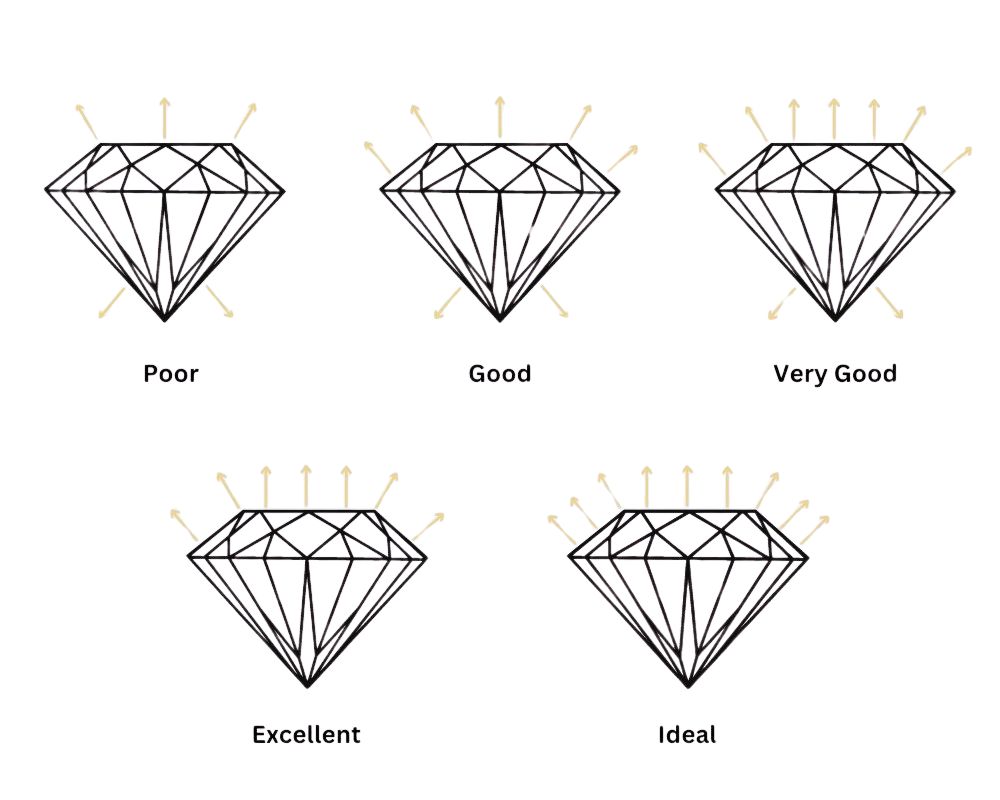• Emerald Lab Diamond • Color: F • Clarity: VVS 2• Carat: 3.03 • CUT: Very Good • Polish: Excellent • Certification No.: 612306529
د.إ 30,024.27
| Color | E |
|---|---|
| Clarity | VVS2 |
| Certificate No. | 612306529 |
| Cut | Very Good |
| Polish | Excellent |
| Carat | 3.03 |
The BZ Diamond Grading Report provides a detailed documentation of the unique characteristics of each diamond. Issued by the Gemological Institute of America (GIA) and International Gemological Institute (IGI), globally respected authorities in the diamond industry, our report ensures the highest standards of accuracy and reliability. Trust in BZ Diamond to offer you transparency and confidence in your diamond purchase.

Every item from BZ Diamond is packaged with utmost care. The diamonds come in a luxurious ring box, placed inside an elegant presentation box, and are complete with your appraisal certificate and GIA & IGI grading reports. Loose diamonds are securely housed in a velvet-lined case, ensuring perfect condition upon arrival. Trust BZ Diamond for a meticulously crafted, high-quality experience.
At BZ Diamond, we prioritize your privacy. All items are shipped in unmarked, discreet packaging to keep your purchase confidential. Whether it’s an engagement ring or a loose diamond, your order will arrive securely and without drawing attention.
For more detailed information on our return and refund policies, including the conditions under which a product can be returned and the process involved, please refer to our FAQ section for all the details.
As a leading diamond company in the UAE, BZ Diamond is committed to providing unparalleled quality, exceptional customer service, and a luxurious shopping experience. Our diamonds are meticulously selected and certified by top industry experts, ensuring that you receive only the best.

Diamond carat weight, a key factor in determining a diamond’s size and value, is precisely measured, with one carat equating to 200 milligrams. Each carat can be divided into 100 ‘points,’ allowing for accurate representation, such as a 0.25-carat diamond being known as a ‘twenty-five pointer.’ For diamonds weighing more than one carat, the weight is expressed in both carats and decimals, like a 1.08-carat diamond being described as ‘one point oh eight carats.’ The image above illustrates various carat sizes against a standard US dime, helping to visually compare how different carat weights—ranging from 0.25 to 5 carats—appear in relation to a familiar object. This visual guide, combined with a precise understanding of carat measurements, ensures that you can make an informed decision when selecting the perfect diamond.

The cut of a diamond is one of the most crucial factors in determining its brilliance and overall visual appeal. Unlike carat weight, which measures the diamond’s size, the cut refers to how well the diamond’s facets interact with light. A well-cut diamond will reflect light internally from one facet to another and disperse it through the top of the stone, resulting in maximum brilliance and sparkle. The quality of a diamond’s cut is graded on a scale ranging from Excellent to Poor. An Excellent cut diamond has ideal proportions, symmetry, and polish, which allow it to reflect the most light and appear dazzling.
Understanding the importance of cut helps you choose a diamond that not only looks beautiful but also maintains its value. Even if a diamond has perfect clarity and color, a poor cut can significantly reduce its sparkle and overall appeal. Therefore, prioritizing a high-quality cut ensures that your diamond will shine brilliantly, making it a timeless and stunning piece of jewelry.

Diamond color is a crucial characteristic that affects both appearance and value. Graded on a scale from D (colorless) to Z (light yellow or brown) by the GIA, colorless diamonds (D-F) are the most prized for their icy white appearance and rarity. These diamonds allow the most light to pass through, enhancing their brilliance and fire. As you move down the scale, diamonds exhibit faint to noticeable yellow or brown tints, which can affect their overall look and appeal.
Near-colorless diamonds (G-J) offer a great balance of quality and value, with slight traces of color that are often hard to detect with the naked eye. Diamonds in the K-M range have a more noticeable color but can still be appealing, especially when set in warmer-toned settings like yellow or rose gold, which can complement their natural hues. Understanding diamond color helps you choose a stone that fits your preferences and budget, allowing you to find the perfect balance between quality, appearance, and cost.

Diamond clarity refers to the presence of internal or external imperfections, known as inclusions and blemishes, respectively. Clarity is graded on a scale from Flawless (FL) to Included (I) by the Gemological Institute of America (GIA). Flawless (FL) diamonds have no inclusions or blemishes visible under 10x magnification and are extremely rare and highly valued. Internally Flawless (IF) diamonds have no inclusions and only insignificant blemishes visible under 10x magnification.
As you move down the clarity scale, Very Very Slightly Included (VVS1 and VVS2) diamonds have minute inclusions that are very difficult to see, even under magnification. Very Slightly Included (VS1 and VS2) diamonds have minor inclusions that are somewhat more noticeable under magnification but are still considered high-quality. Slightly Included (SI1 and SI2) diamonds have inclusions that are noticeable under magnification and sometimes visible to the naked eye. Included (I1, I2, and I3) diamonds have obvious inclusions that may affect transparency and brilliance.
